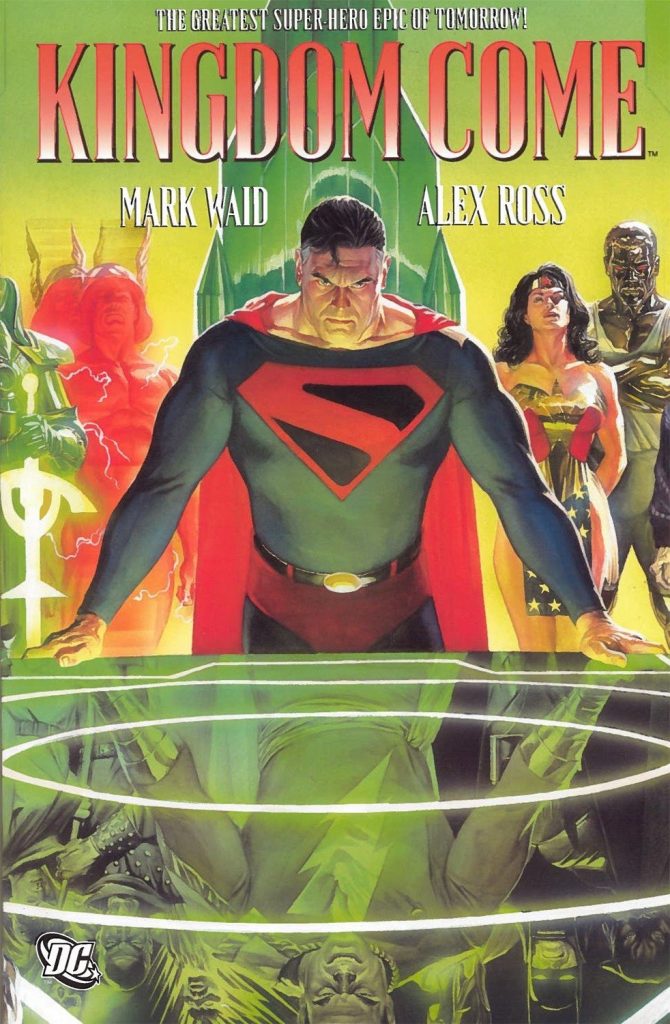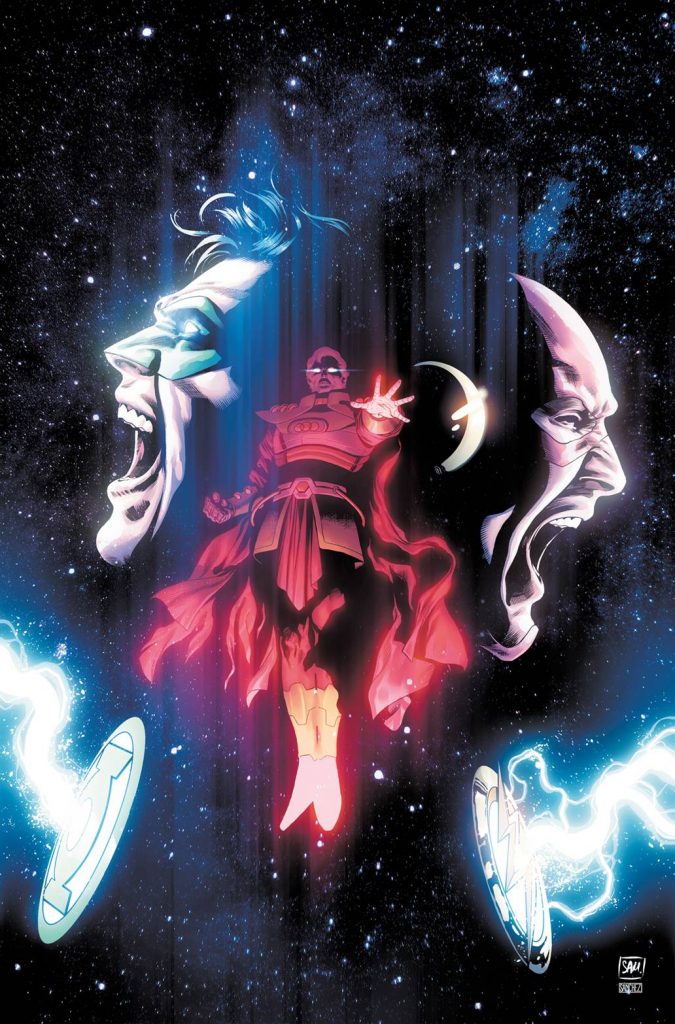On Lunar Distribution, and How Certain Things Work
The comic industry is a complex one. While we often act as if its performance operates exclusively on the poles, where one end is titanic success and the other is doom and gloom, it’s not as simple as that. The very idea of the “comic industry” is a bit of a misnomer, even. It’s really an archipelago of connected markets — the direct market, 1 the book market, 2 direct download digital, 3 subscription digital, 4 webcomics, 5 and a mess of others — that form that larger whole. More than that, what might look like a banner stretch in any of those individual fiefdoms could be a time of despair elsewhere. Good or bad is relative, depending on the market you’re in and how you operate.
Even in the direct market alone, how things are going varies wildly from shop to shop. That’s why my retailer features tend to feature a variety of perspectives from a mix of locations. It’s important to underline how different approaches and locations impact performance, both for the good and bad. And sure, the gaggle of retailers featured within my pieces might not be representative of the whole. But they still provide a much broader look at the way things are than any singular view.
Still, individual perspectives can be interesting. Retailer Brian Hibbs’ Tilting at Windmills column has always been exactly that, as the owner of San Francisco’s Comix Experience provides an often insightful look at the retailer experience. I’ve talked with Hibbs in the past, even recently, and it’s always interesting to hear what he has to say, even if I don’t always agree with it. Sometimes, though, the column triggers klaxons in my brain, warning signs about something within it not totally working out in my head. That happened recently as I read his essay on the dip he saw in his DC discount through Lunar Distribution.
It’s a lengthy post, one you can read here in full, but the biggest takeaway was that Hibbs’ 33-year-old discount of 55% 6 had dropped to 50%. This decrease, per Hibbs, takes DC’s single-issue comics to the precipice of being unprofitable for him, resulting in a conclusion of, “I didn’t leave periodical comics. Periodical comics are leaving me.” because of that shift. That’s the point those aforementioned klaxons started firing, and it’s for three main reasons: 1) how much of a bummer that is for Hibbs’ and his shop; 2) the uncertainty in my head as to whether this was an experience others had; and 3) whether this was the catastrophic issue it was present as.
Based off a tweet thread by Hibbs’ peer Ryan Higgins, the owner of nearby Sunnyvale, California’s Comics Conspiracy, the latter seemed unlikely. Higgins pushed back strongly at the idea that things were as dire as they seemed, and made me question my initial take from Hibbs’ piece, which was that this discount drop was an across-the-board one. There was only one way to find out if that was the case, or if it was as desperate a situation as Hibbs suggested: it was time to have some conversations.
Now, some were with other retailers, getting their take on how all of this worked. But the most important one was with Lunar Distribution’s co-owner Christina Merkler. While I could dance around the subject, no one was going to know more about how everything works than the main person at the company at the core of Hibbs’ piece. And when it came to my key question – did all shops see a recent dip in its DC discount through Lunar? – the answer was pretty clear. 7
“Not all retailers saw a change in their discount when these updates were made,” Merkler said. “The large majority of retailers did not change with any of these updates. A small percentage went down, as well as went up, with each of these evaluations.” 8
The reason for that is simple, and it’s something Hibbs mentioned in his piece. The direct market operates off volume-based discounts, meaning a shop’s discount is determined by its “average monthly invoiced dollars at retail price,” as Merkler phrased it. For Lunar, the assessment for shop discounts takes place every six months, with the most recent one being the third update to DC’s discount tiers for shops in the Lunar Era. And per Merkler, how a shop’s discount did – or didn’t! – change depended purely on the shop — or shops even, as accounts that have multiple stores are grouped together. 9 Order more, your discount could go up. Order less, it might go down. Stay in the same range, your discount stays the same. It’s fairly straightforward.
These discounts are “calculated” and distributor-based, something Hibbs bristles at, suggesting it makes little sense in the multi-distributor present after decades of Diamond Comic Distributors being the single player in the market. That’s an understandable complaint, albeit one with no easy solution given how distribution has divided. But as emphasized by discounts being maintained by most shops, it’s clear others are making it work. More than that, as Merkler noted, DC itself determines the discount tiers, and the tiers Lunar is using are the same ones the publisher offered through Diamond previously.
And as distribution expands, retailers have more options than before. For example, some shops – including Comix Experience – order many of their trades and graphic novels through Penguin Random House, DC’s book market distributor. That splinters DC dollars, and in an industry with discounts determined at a distributor level, that can be a problem. Spend the same as you did in the past but at two distributors, and all of a sudden your invoiced dollars drop by half — or more. That’s a clear risk to your discount. Even with that in mind, the reasons to go that direction were clear to Hibbs, as PRH offers free shipping and consistently had “a greater amount of DC Perennial backlist stock” than Lunar.
The latter was an aspect the retailer specifically called the distributor out for, saying that they have a “pretty mediocre stock” of backlist releases, and that they appear “to be stocking backlist inventory based” on sales through In-Stock Trades, a retail company owned by Lunar’s co-owners. That was a spicy take by Hibbs! It was also one that made me wonder, “Could that possibly be true?” It turns out that no, that is in fact not the case.
“DC determines all the backlist inventory that we carry,” Merkler said. “They monitor sales through us and their book market distributor and transfer stock accordingly. Lunar does not dictate what we carry of DC’s backlist.”

Back to the main point, though, which is the discount drop. That’s the crux of this. Dropping such a significant amount is a backbreaker, and one that Hibbs is understandably pained by. I asked Merkler whether there was anything that could have been done to avoid this, or if there were any tactics they utilize to prevent shops from going through this exact type of pain. The answer was yes, there were many systems in place to do just that.
It wasn’t just Merkler emphasizing this, though. One shop I talked to mentioned how difficult it is to be surprised by where you stand with Lunar, if only because of how much effort they put in to remind retailers of their current position relative to their discount. They noted that simply logging into your Lunar account resulted in an immediate reminder as to where you are — you get an idea of your projected position, and what you need to take a leap up to the next level — and that shops regularly receive reminders from the distributor as they approach the discount window ending. That’s pretty much the playbook, per Merkler, who walked me through what they do to help shops stay on top of their status.
“Approximately two months before the discount evaluation is updated, Lunar sends a reminder to all accounts that they should check their account dashboard to make sure they are aware of where their discount tier current is, how close they are to maintaining that, and how close they are to bumping up to the next tier. This dashboard is the first page every account sees when they log in to their account. This is always available to the account and is updated in real time. We send an additional two to three emails before the discount updates are made to remind accounts to make purchases by a certain date to ensure that their invoiced purchases are made by the deadline date.
We also work with DC to offer backlist sales to help retailers maintain or reach the next tier before that deadline arrives. This gives the retailer the opportunity to purchase backlist items at an additional discount and benefit from the retail price being added to their overall monthly spend.”
The effort was there to reinforce what was necessary for retailers to maintain their discount. Some shops followed up on those suggestions and pushes, making a difference to their discount tier in the process. Others didn’t. From there, it’s six months until the next discount evaluation – a timeframe Merkler noted that DC determined – which might seem like a lengthy span, but it’s in the ballpark of Diamond’s quarterly evaluation period. 10
The point, though, is this: DC’s discount did not drop across the board. In fact, it seems as if the discount stayed level for most, perhaps in part because Lunar was diligent in reminding shops of the potential dip they could see if adjustments weren’t made. If that’s the case, then why was there so much ire for the situation, beyond the obviously unfortunate drop in discount Comix Experience saw? Here’s where a little necessary history must be added.
Merkler doesn’t just co-own Lunar, DC’s single-issue distributor. She also co-owns Discount Comic Book Service – or DCBS – and In-Stock Trades, two online comic vendors that are pure mail-order, selling the same product as comic shops but at a distance. This is where much of the consternation lies, as Hibbs himself says in that piece that ordering through Lunar does “little else but fund our own competitor.”
Merkler is, unsurprisingly, quite aware of this. She told me, “There is a very small contingent of retailers that are not happy with Lunar, and I really cannot do anything about that.” She described most shops as being “very happy” with Lunar, something she said was confirmed at a recent retailer event at C2E2, which they plan on doing more of in collaboration with ReedPop at next year’s Emerald City Comic Con, C2E2, and New York Comic Con. But those negative feelings some retailers have are difficult to overcome.
That beef is even understandable to a degree. By their very nature of selling the same product, DCBS and In-Stock Trades compete with comic shops for the same customers — just like any other comic shop does. That said, while that idea adds up in theory, it’s also worth noting that there has been zero evidence that this has affected Lunar’s performance at all. One retailer who dislikes DCBS even begrudgingly admitted to me that they are the strongest distribution partner shops have today.

The good news for shops that cannot abide ordering from Lunar is they’ll soon have another option. Universal Distribution is being added in October as an alternative for DC thirsty retailers. While the Canadian company was always available as a sub-distributor through Lunar, DC will be working with both as distribution partners, 11 as well as Diamond UK and Penguin Random House for Europe and the book market respectively. That means those who cannot stand the idea of, as Hibbs phrased it, funding their “own competitor” have a new direction they can go in. Granted, that further splinters the distribution game, and with discounts that are determined at a distributor level, that could be even more problematic. 12 But alternatives are coming for those that desire them.
That’s the place the direct market finds itself in. There are more options than its seen in decades, whether it’s from a comic release standpoint or a distributor one. That puts every shop in a position of having a more wholly unique experience relative to its peers than perhaps ever before. There’s good and bad that comes with that, of course. Some shops are thriving in this environment. Others aren’t. Ultimately, though, this is why it’s important to remember that each retailer doesn’t represent the entire market, and why any single shop’s negative experience doesn’t necessarily mean doom and gloom is back on the menu.
If you enjoyed this feature, consider subscribing to SKTCHD for more in this vein. Additionally, one correction about the nature of the relationship between Lunar and In-Stock Trades was made after publishing.
Comic shops.↩
Bookstores, both online and off.↩
Single item based efforts like ComiXology’s individual issue and graphic novel sales.↩
ComiXology Unlimited, Marvel Unlimited, DC Universe Infinite, etc.↩
Like the traditional idea of webcomics on the websites and social presences of creators, but also platforms like Webtoon and Tapas.↩
Meaning all DC comics he ordered were discounted 55% off cover price, which helps determine how profitable comics are for the shops that sell them. The higher the discount, the better for shops.↩
And backed up by my other conversations.↩
There’s been three of these evaluation windows so far, which is what Merkler was referring to at the end.↩
Which previously included Comix Experience, before Hibbs sold his other shop Comix Experience Outpost in July 2021.↩
Something I was told existed, but it’s unknown whether those evaluations happen on the regular.↩
With Lunar also having global rights, as Merkler noted they currently service “almost 400 international accounts.”↩
Not to mention potential point-of-sale related heartburn, although I imagine Universal has that largely locked in due to being in the game for a while now.↩

